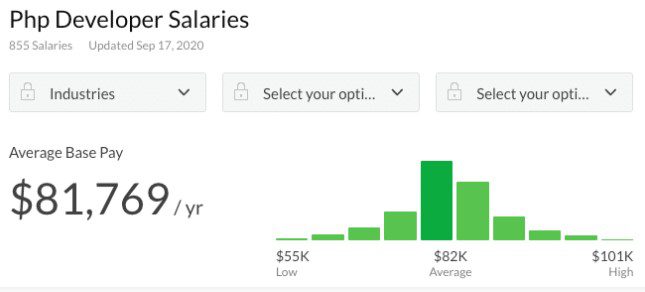PHP development stands at a crossroads of opinions. Some view it as a steadfast, reliable language, while others dismiss it as outdated. Amidst this debate, one crucial aspect demands attention: the PHP developer salary. In this article, we’ll unravel the numbers behind PHP development salaries, exploring its pros and cons, the tasks involved, and the essential skills needed for success.
Is PHP Developer a Good Job?
What Does a PHP Developer Do?
Role and Responsibilities
As a PHP developer, your primary focus lies in backend web development. You’ll be responsible for foundational work on web applications, collaborating with frontend developers, and integrating databases into PHP applications. Beyond the initial setup, your role extends to maintenance, addressing incompatibilities, updating code, and managing databases and forms.
What Do You Need to Be a PHP Developer?
Essential Skills
Entering the world of PHP development requires a blend of technical skills and practical experience. While a degree holds significance, employers often prioritize hands-on experience, making freelancing, internships, and entry-level positions valuable for building a robust skill set. Key skills include teamwork, project management, troubleshooting, and communication. Additionally, a grasp of databases, HTML/JavaScript basics, and an understanding of PHP’s interaction with other languages are crucial.
The Average PHP Developer’s Salary
Overview of Salaries
The much-anticipated moment arrives: exploring PHP developer salaries. Self-reported statistics offer insights, with figures from various sources providing a ballpark estimate. Glassdoor suggests an average of $81k/year, while ZipRecruiter and PayScale present different perspectives, emphasizing the variability within this field. It’s essential to consider these figures as approximations, with the Bureau of Labor reporting a broader view of web developer salaries.
PHP Developer Salaries by Experience Level
Salaries diverge significantly based on experience. Junior PHP developers, with limited experience, may expect an average of $64k/year. As you ascend to a senior level (3-5 years of experience), salaries can reach an average of $92k/year, reflecting the correlation between experience and compensation.
Agency vs. Freelancing PHP Developer Salary
Navigating Freelance Opportunities
Freelancing, though challenging, presents opportunities for PHP developers. While freelancers shoulder the responsibility of self-marketing and income generation, their earning potential can surpass industry averages. ZipRecruiter indicates an average freelance PHP developer salary of $89k/year, outperforming general freelance web developer salaries.
Comparing Agency and Freelance Salaries
Comparing freelance PHP developers to agency roles reveals interesting dynamics. Junior PHP developers in agencies may earn around $63k/year, while senior PHP developers in agencies average approximately $94k/year. Freelancers, with varied hourly rates, demonstrate the potential to surpass agency salaries, dependent on effective rate negotiation.
Average PHP Developer’s Salary by Country

PHP Developer’s Salary
Global Perspectives
PHP developer salaries exhibit geographical variations. While the United States leads with an average of $81k/year, European countries like Switzerland and Denmark boast competitive averages. Meanwhile, developing nations like India report lower average salaries, emphasizing the global diversity in PHP development compensation.
Full Stack PHP Developer Salary
Rewards of Full Stack Expertise
Full stack PHP developers, equipped with comprehensive skills spanning backend and frontend development, command higher salaries. Averaging around $106k/year (Glassdoor) and $113k/year (Indeed), full stack PHP developers exemplify the lucrative potential associated with mastering multiple facets of web development.
Are PHP Developers Paid Less?
Contextualizing PHP Salaries
In comparison to other programming languages, PHP developer salaries, especially for entry-level positions, may appear less enticing. PHP’s ease of learning contributes to increased competition among junior developers, impacting initial earning potential. However, as PHP developers progress in skill and complexity, their salaries become more competitive, aligning with industry standards.
Conclusion
PHP development, despite its perceived lower average salary, offers stability, versatility, and ample opportunities for growth. Aspiring developers should consider the evolving nature of PHP salaries, understanding that proficiency and experience play pivotal roles in attaining higher compensation.